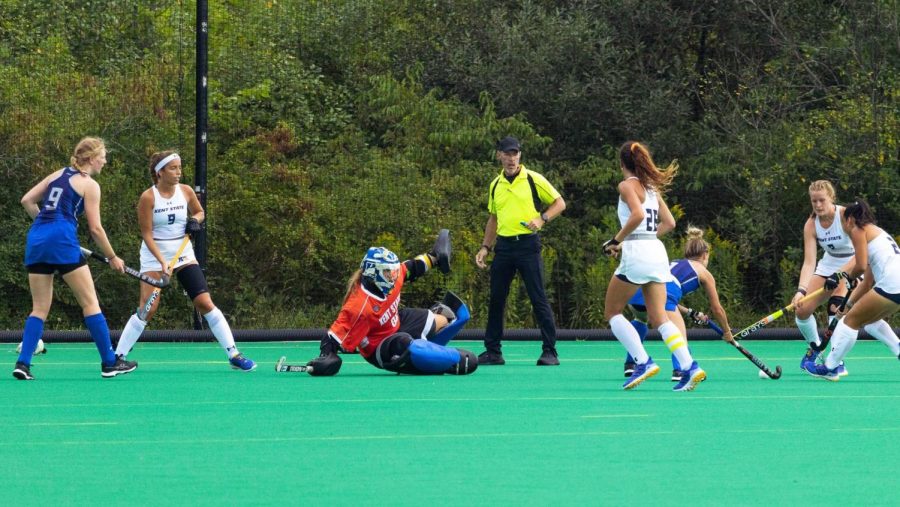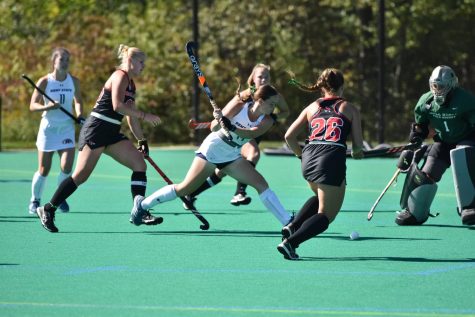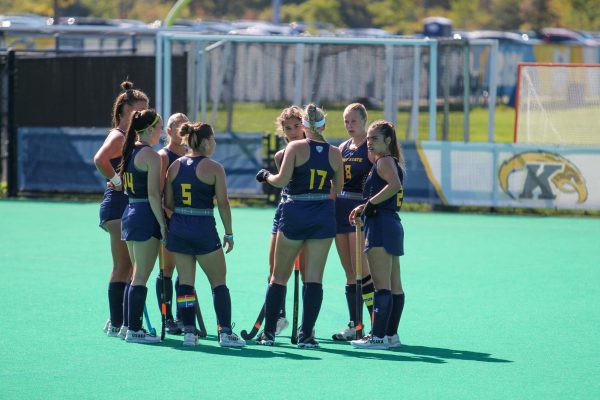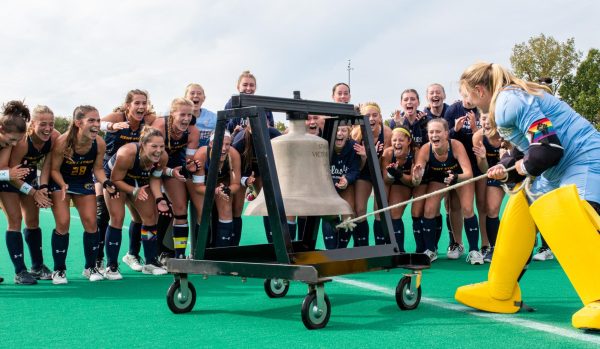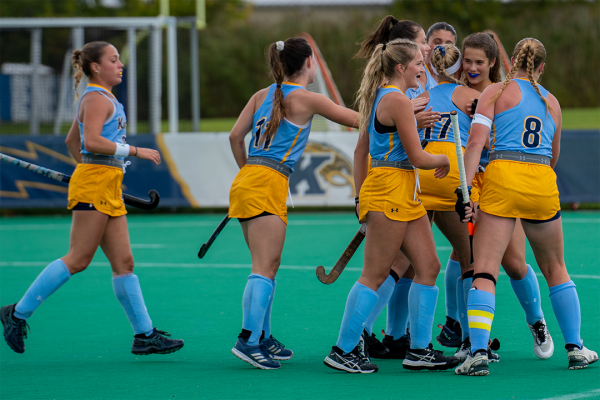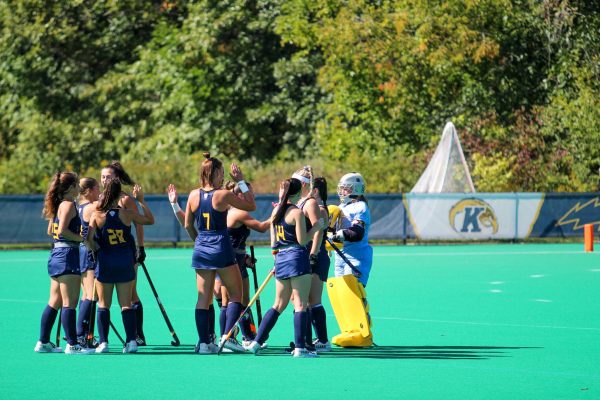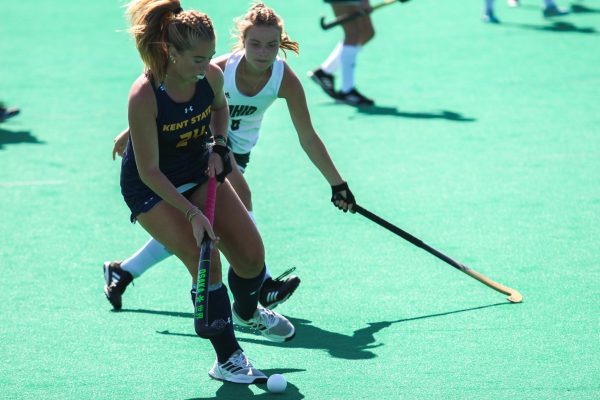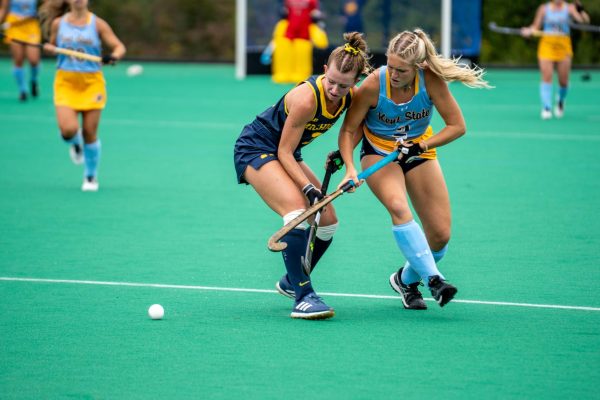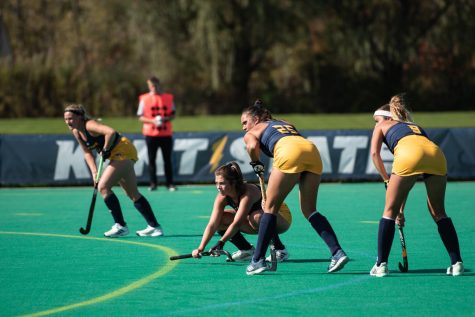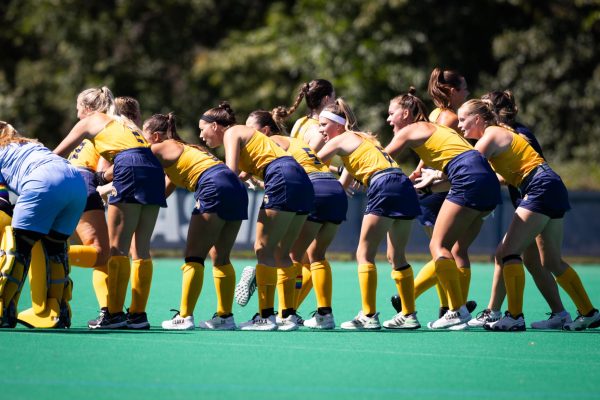Azure Fernsler has overcome years of bad knees to become one of MAC’s top field hockey goalies
September 28, 2021
In 2017, Kent State field hockey goalie Azure Fernsler decided her right knee couldn’t handle the intensity of college field hockey.
The only solution, she thought, was surgery — her second in five years.
But after the December operation, her surgeon told her that her career could be over.
“I’m not going to try and tell you not to play again,” she told her, “because you’re going to try it anyway.”
Fernsler did indeed try it anyway, and two years later she is starting on the No. 23 team in the country and already has been named national player of the week.
Fernsler’s knee problems dated to junior soccer in third grade. Her legs were shaped differently than many people, she said, and sometimes would simply pop out of joint.
By middle school, she started to realize that the jumping, diving and mobility needed to cover soccer’s big net was too much for her.
Before winter of Azure’s seventh grade year, Fernsler’s father, Anton, got an email from a phys-ed teaching colleague looking for a goalie for their field hockey team.
“How about Azure?” her dad asked. Without talking to her, he signed her up for the team.
Azure’s reaction? “Dad, are you kidding me?”
Still, Azure and her dad got to work.
“I told her we were going over to the middle school to hit field hockey balls,” Anton said. “She put on the equipment, and I started hitting field hockey balls at her.”
She had surgery on both knees in August before eight grade, which caused her to miss the season.
Her mom, Deborah, and grandmother had both played and coached field hockey. They and her dad became Azure’s first field hockey coaches.
“They would give me pointers,” she said. “They taught me things like staying on the balls of your feet, always being ready, and as soon as the ball comes in to clear it.”
But her mom passed away unexpectedly in August of 2013 of liver failure. It was the first day of Azure’s high school practice. Her mom didn’t get to see any of Azure’s high school games at Wilson High School in West Lawn, PA.
Fernsler’s dad and high school coach Kim Underwood helped her get through her mother’s death.
“Kim Underwood did an amazing job, stepping into being a mother-like figure,” Anton said. “Along with that, she found faith, which continues to be a huge part of her life.”
Azure’s mom and Underwood both worked in the same school district.
“She told me my mom always loved that I played field hockey and was so happy I chose to continue playing it,” Fernsler said. “At the end of the day no matter what happend, I knew my mom was proud of me.”
Azure’s knee problems didn’t end with the surgery. Her left knee improved, but the other didn’t.
“In my first or second game back in high school my freshman year, my knee popped out of place,” Fernsler said. “I literally straightened my leg, and my knee popped back in place.”
Azure worked closely with high school trainer Kiernan Melograna to keep on the field.
“I did strength and training,” she said. “I did a lot of rehab, just to make sure they stayed strong.”
Azure was recruited to Kent State by some of the old coaches. She was being recruited by other schools as well, but chose Kent State after a visit on campus.
Azure found her freshman year a struggle physically.
“The workload from high school to college was a lot different,” Fernsler said. “The intensity is higher, the ball speed is higher, and I was still having [knee] problems.”
She still started six games for the Flashes and played in two more.
But she had surgery in December.
“They cut her femur and moved it over and plated it and screwed it,” Anton said. “The plate was irritating the tendon, so we had to have another surgery to remove it.”
The recovery took a full year.
“I had to learn how to walk properly again,” Fernsler said. “Because they realigned my femur, walking was different and learning how to jog again was different.”
At first, she said, she put a weight on my leg and just walked around the edge of the practice field. She spent time on an underwater treadmill and an ultra gravity treadmill to build up her strength.
It was hard — physically and mentally, she said.
“My faith really sustained me during the process,” she said. “Also, my teammates, my family and friends were really supportive.”
Fernsler has continued to push through the pain.
“Azure is one of the toughest, caring and hard working individuals I not only had the chance of coaching, but meeting,” coach Kyle DeSandes-Moyer said. “She puts a lot of care into her actions, whether it’s on the field or off the field.”
In 2019, Fernsler played in 15 games and was third in the Mid-American Conference in shutouts and third in saves.
In the 2021 spring season, Fernsler made the all-MAC second team.
This season Fernsler had five saves when the Flashes upset No. 22 Ohio State 3-1 on Aug. 31. Four days later Kent State had another upset victory, this time against No. 14 Syracuse 2-1. Fernsler had seven saves.
Those two performances earned Fernsler the defensive player of the week from the National Field Hockey Coaches Association.
“It’s definitely not just my award,” Fernsler said. “My teammates played shutdown defense that gave me the opportunity to play at a really high level.”
“I’m just happy I get to play, and I thank God everyday for giving me the opportunity to play.”
Fernsler continues to be a leader for the Flashes, who are 5-2 and have been ranked 23rd in the country for three weeks in a row.
“Azure definlety leads by example,” DeSandes-Moyer said. “She is always working hard, showing up at the extra-option things and cheering her teammates on.”
Azure knows her playing career will be over with the end of season. Her knees are in constant pain. “Physically, I want to be able to do things when I’m older,” she said.
But she hopes her field hockey days aren’t over.
“I’m looking to coach at the college level,” Fernsler said. “I coached a club team over the summer, and they said they would love to have me back.”
“It is going to be transitioning to how I can help coach other people. I want to be able to give back to the sport that gave so much to me.”
Jacob Hansen is a reporter. Contact him at [email protected].


